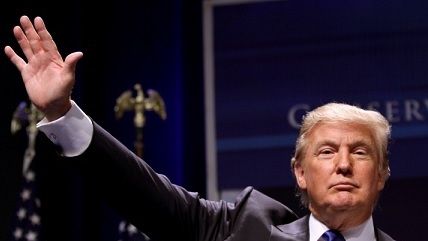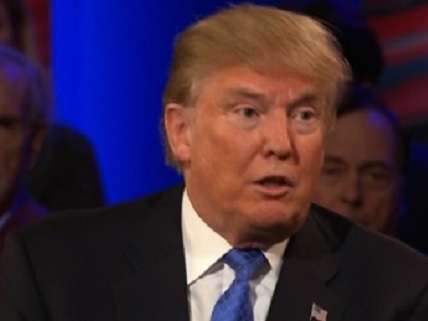Donald Trump is No Non-Interventionist
Doesn't quite want to get rid of NATO, but may want to get rid of the Geneva conventions.


NATO is obsolete, Donald Trump explained at a CNN town hall earlier this week, saying the military alliance, formed as a defense against the Soviet Union, was out of date.
Trump is right. NATO is an artifact of the Cold War, which ended a quarter of a century ago. Rather than dismantling the alliance once it had outlived its usefulness, American and other Western leaders instead looked to refocus and expand NATO. NATO spread eastward toward the Russian frontier while finding other ways to flex its muscle, most notably the Kosovo campaign in 1999 and the NATO-led intervention in Libya in 2011.
Despite broad bipartisan support for NATO, there's little in the way of justification for the military alliance. Serbia (the aggressor in Kosovo) never presented a national security threat to the United States, while those terrorist groups the U.S. considers a threat to its national security today (like ISIS and Al-Qaeda) were absent in pre-2011 Libya but have found safe spaces there since then.
But Donald Trump's critique of NATO wouldn't see the U.S. disengage from what's become an entangling alliance. (The U.S., for example, is obligated to defend Turkey in case that country is attacked—Turkey is focusing its counterterrorism efforts in the Middle East more on Kurdish separatists than on ISIS, while the U.S. is working with the Kurds in the campaign against ISIS).
But despite his position being characterized by some as being in favor of "abolishing" NATO, Trump has repeateldy stated he would like to see the alliance continue.
"I don't mind NATO per se," Trump told Fox & Friends last week, for example. "It has to be reconstituted, it has to be modernized," he said. "We need to either transition into terror or we need something else, because we have to get countries together."
He repeated the same critique at this week's town hall, calling for NATO to refocus on terrorism and for other member countries to pay more into the alliance, following a broad Trump theme that the U.S. pays too much and other countries pay too little for America's military presence and actions abroad.
In an interview with the Washington Post's editorial board earlier this month, Trump also questioned the useful of NATO, laying out what the Post described as an "unabashedly non-interventionist approach to foreign policy." Interpreting Donald Trump's often chaotic and even self-contradictory pronouncements on foreign policy as some kind of commitment to non-interventionism is a serious mistake.
What was so "non-interventionist" about Trump's comments to the Post?
Trump left the door open to withdrawing troops from places like Japan and South Korea (though he'd prefer to keep them stationed there and have the hosting countries pay more for that), re-iterated his skepticism about the war in Iraq, and stressed that other NATO countries should be doing more of the heavy-lifting, especially when it comes to situations like Ukraine, which are far more relevant to those countries than to the U.S.
And at another town hall this week, Trump identified the Geneva conventions, which define a range of war crimes, was a problem that made soldiers "afraid to fight." He lamented that U.S. forces could not waterboard people or chop heads off. Not exactly concerns shared by, uh, actual non-interventionists.
Trump's primary critique of NATO, the war in Iraq, and American intervention in other countries isn't the unintended consequences or actual counter-productivity of the specific interventions, but that the United States is not reimbursed properly for it.
As far back as 1987, the first time Donald Trump flirted with a presidential run, Trump has expressed the idea that America's allies should be paying more its support. That year, in a speech in New Hampshire, Trump said he was tired of the U.S. "being kicked around" by its allies, who had become "the world's greatest money machines" because the U.S. was funding their defense. "We should have these countries that are ripping us off pay off the $200 billion deficit," Trump said, according to a contemporaneous New York Times report.
Then, as now, Trump insisted the "right person" could negotiate better deals for the U.S. with its allies. Restructuring American hegemony to formalize the payment of tribute is hardly a non-interventionist stance. Perhaps more importantly, it's impossible for Donald Trump to be a non-interventionist and anti-trade at the same time. Sound non-intervention requires free trade, which liberates and liberalizes countries far more effectively than military action.
The U.S. lost tens of thousands of troops in Vietnam, with millions of Vietnamese casualties, and lost Vietnam to communists. A decade-plus of free trade brought more prosperity to Vietnam than U.S. war ever could. For Donald Trump and his zero-sum world view, a prosperous, liberalizing Vietnam is bad for America. Trump would work toward wiping out more than half a century of unprecedented global economic growth and poverty eradication in sacrifice of some misguided notion that what's wrong with America is that not enough of its young people are employed in factories like they once were.


Show Comments (122)